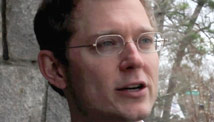
Editor's Note: The Rev. David Lewicki is co-pastor of North Decatur Presbyterian Church in Decatur, Georgia. He is a graduate of Yale University and Union Theological Seminary and was ordained in 2005 by the Presbyterian Church (U.S.A.).
By the Rev. David Lewicki, Special to CNN
On Sunday night I watched the news as it crescendoed around the president’s speech declaring the death of Osama bin Laden. The talking heads worked capably with what few details they had. On the split screen, familiar spliced video footage replayed what little most of us know — or care to know — about bin Laden: wearing a turban, sitting drinking tea, a long salt and pepper beard, speaking to friends, crouching holding a machine gun, skyscrapers smoking.
Twitter gave a way to take the public temperature. Some passed information without editorial: “Bin Laden is dead!” Others tried to score political points: “took O 2 years to do what B couldn’t do in 7,” or “THAT’S a ‘mission accomplished.’” Reports said impromptu crowds gathered in front of the White House and at Ground Zero exuberantly chanting “USA! USA!,” singing our anthem. Others retorted that they would not celebrate any person’s death, no matter who it was. Still others retrieved unsettling data about what it has cost us to find and kill bin Laden, in dollars and human lives.
Finally, from those with an intimate connection to the innocents of 9/11, there were tweets about tears. Tears of relief? Tears because the news dragged them back to the still-tender memories of a decade ago? Yes and yes. I was a first-year theology student in New York City on that day in 2001; I know the tears.
All of these responses are authentic for a Christian who lives in America. Bin Laden has had more influence in the last decade over the way we live our lives than any other person. He was a wedge in our politics, he disrupted our ability to come and go freely; he triggered a vast global security and surveillance apparatus. He was directly or indirectly the focus of two wars that affected the material well-being and peace of mind of millions here and across the world.
He desecrated Islam and radicalized Christianity, making some Christians more enthusiastic about military action than they might have been otherwise, while making others more enthusiastic about trying to find peaceful solutions to global problems.
He robbed people of mothers and fathers, took away their children. He made a whole nation feel vulnerable and fearful of unpredictable catastrophic violence.
One thing we might do well today is give permission to each other to feel all of the things that we might be feeling. There is no one manner by which to respond to this man’s death, because his life impacted all of us, sometimes in radically divergent ways.




No comments:
Post a Comment